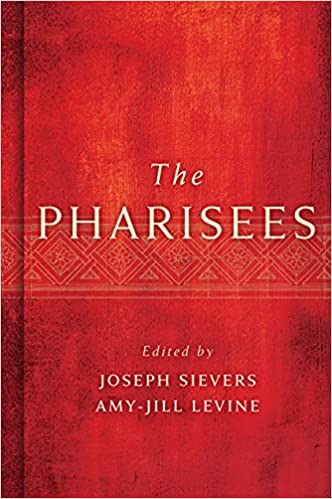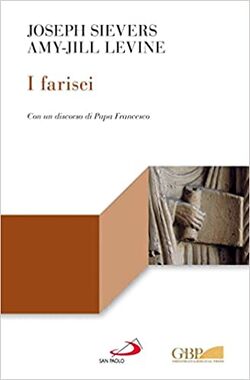File:2021-E * Sievers Levine.jpg
2021-E_*_Sievers_Levine.jpg (332 × 499 pixels, file size: 32 KB, MIME type: image/jpeg)
{en} Joseph Sievers - Amy-Jill Levine, eds. The Pharisees. Grand Rapids, MI: Eerdmans, 2021.
{it} Italian ed. (2021) : Joseph Sievers - Amy-Jill Levine, eds. I farisei. Roma [Italy]: Edizioni San Paolo, 2021.
Abstract
"A multidisciplinary appraisal of the Pharisees: who they were, what they taught, and how they’ve been understood and depicted throughout history ... For centuries, Pharisees have been well known but little understood—due at least in part to their outsized role in the Christian imagination arising from select negative stereotypes based in part on the Gospels. Yet historians see Pharisees as respected teachers and forward-thinking innovators who helped make the Jewish tradition more adaptable to changing circumstances and more egalitarian in practice. Seeking to bridge this gap, the contributors to this volume provide a multidisciplinary appraisal of who the Pharisees actually were, what they believed and taught, and how they have been depicted throughout history ... The topics explored within this authoritative resource include: the origins of the Pharisees; the meaning of the name “Pharisee”; Pharisaic leniency, relative to the temple priesthood, in judicial matters; Pharisaic concerns for the Jewish laity; Pharisaic purity practices and why they became popular; the varying depictions of Pharisaic practices and beliefs in the New Testament; Jesus’s relationship to the Pharisees; the apostle Paul and his situation within the Pharisaic tradition the question of continuity between the Pharisaic tradition and Rabbinic Judaism; the reception history of the Pharisees, including among the rabbis, the church fathers, Rashi, Maimonides, Luther, and Calvin; the failures of past scholarship to deal justly with the Pharisees; the representations, both positive and negative, of the Pharisees in art, film, passion plays, and Christian educational resources; how Christian leaders can and should address the Pharisees in sermons and in Bible studies ... Following the exploration of these and other topics by a team of internationally renowned scholars, this volume concludes with an address by Pope Francis on correcting the negative stereotypes of Pharisees that have led to antisemitic prejudices and finding resources that “will positively contribute to the relationship between Jews and Christians, in view of an ever more profound and fraternal dialogue.”-- Publisher description.
Contributors: Luca Angelelli, Harold W. Attridge, Vasile Babota, Shaye J. D. Cohen, Philip A. Cunningham, Deborah Forger, Paula Fredriksen, Yair Furstenburg, Massimo Grilli, Susannah Heschel, Angela La Delfa, Amy-Jill Levine, Hermut Löhr, Steve Mason, Eric M. Meyers, Craig E. Morrison, Vered Noam, Henry Pattarumadathil, Adele Reinhartz, Jens Schröter, Joseph Sievers, Matthias Skeb, Abraham Skorka, Günter Stemberger, Christian Stückl, Adela Yarbro Collins, and Randall Zachman.--Publisher discussion.
“This volume provides an authoritative and comprehensive update on the Pharisees. The articles, written by leading scholars, consider the Pharisees including their reception history and legacy up to the present from multiple perspectives, based on careful analyses of diverse sources such as the Qumran scrolls, Josephus, the New Testament, rabbinic literature, and Christian writers. Written in a manner that is accessible to specialists and non-specialists alike, this volume should be considered an essential resource on the Pharisees.”— Jodi Magness, University of North Carolina at Chapel Hill
“Tackling the caricatures of the Pharisees deeply embedded in contemporary Christian misunderstanding of ancient Judaism is no easy task. Sievers and Levine are to be warmly congratulated on bringing together a remarkable multidisciplinary array of scholars not only to dispel myths about the role of the Pharisees in Jewish society in the time of Jesus but also to explore the role of those myths in Jewish-Christian relations over the centuries down to the present. This book will enlighten many and deserves to have an impact on a wide readership.”— Martin Goodman, University of Oxford
“The 1974 Nostra Aetate Guidelines issued by the Vatican’s Commission for Religious Relations with the Jews warn against the pejorative use of the words ‘Pharisee’ and ‘pharisaism.’ However, this warning was not adequately heeded and even today at the highest levels in the Christian world such negative use of these terms continues, reinforcing harmful anti-Jewish stereotypes. This valuable collection of modern scholarship is not only important in providing a more accurate understanding of who the Pharisees were and what they stood for but is also a significant contribution towards combatting anti-Judaism and anti-Semitism, which continue to blight our world.”— Rabbi David Rosen, International Director of Interreligious Affairs, American Jewish Committee
“The editors of this book have assembled an international team of experts to consider the Pharisees from numerous angles, from how they are presented in ancient sources, including the books of the New Testament and rabbinic literature, to how they have been presented throughout subsequent centuries, whether by Jews or Christians, whether in writing, art, drama, or film. Practical suggestions for improvement in teaching and preaching cap the volume off. A rich offering indeed!”— James C. VanderKam, University of Notre Dame
“Who hasn’t heard a homily denouncing the Pharisees as the archenemies of Jesus? This volume breaks open the complexity of the Pharisaic Movement and the stereotypical understanding that Christians have had of it, and it demonstrates the Pharisaic themes that positively influenced Jesus’s teachings. The inclusion of Pope Francis’s address on the Pharisees is a plus. The book is a must-read for anyone who preaches from the New Testament.”— John T. Pawlikowski, OSM, professor emeritus at Catholic Theological Union and honorary life president of the International Council of Christians and Jews
“In this book is everything you’d want to know about the Pharisees, from ancient origins to modern films, from Jesus and the Pharisees to the Pharisees and the rabbis. Elegantly edited, the more than two dozen essays in this volume strike the ideal balance between scholarship and accessibility. Will appeal to many readers, from tyro to specialist.”— Leonard Greenspoon, Creighton University
“This is a most welcome collection of essays. The volume not only assembles an outstanding group of scholars from diverse disciplines, including Hellenistic Judaism, the Dead Sea Scrolls, Second Temple archaeology, New Testament, rabbinics, and patristics, but it also has an admirable mission: to revise the stereotypical image of Pharisees that has fueled prejudice and anti-Semitism. The papers skillfully question or undermine numerous common assumptions, such as Pharisees as representatives of an unyielding Jewish conservatism, Paul as abandoning Pharisaism, and the links between Pharisees, the rabbis, and the church fathers. The volume further traces the changing perceptions of Pharisees from medieval and early modern theologians through modern historiography, film, and contemporary textbooks and teaching. There is no other work like it.”— Erich S. Gruen, University of California, Berkeley
“Do we need yet another book on the Pharisees? Can there possibly be a new perspective? The answer is yes. Joseph Sievers and Amy-Jill Levine, editors of the collected studies of this volume, have presented us with a book chock-full of new and exciting approaches. Twenty Jewish, Protestant, Catholic, and other scholars have produced a volume freeing the Pharisees from the shackles of prejudice and stereotype. Chapters on historical reconstruction, reception history, and the future of Pharisee studies make this volume required reading for anyone interested in ancient Judaism, early Christianity, and the reception of the Pharisees in art, music, film, and much more.”— Joshua Schwartz, Bar-Ilan University
“This is a unique volume, which combines history and theology, scholarly research and an ecumenical spirit. The Pharisees do not need to be ‘saved’ from centuries of Christian prejudice; they need to be rediscovered for what they were—a powerful and creative group that reshaped the parental tradition of Judaism along with the early Jesus movement. The competition and dissent between these two Second Temple Jewish groups were not the result of estrangement or mortal combat, but of a complex relationship of spiritual closeness that put each of the siblings in a continuous dialogue with the other.”— Gabriele Boccaccini, University of Michigan
“The Pharisees, edited by Joseph Sievers and Amy-Jill Levine, provides a treasure trove of essays for anyone interested in the various facets of the historical investigation of this movement. The Jewish, Catholic, and Protestant scholars from so many lands represent the very best of contemporary work in their fields and make this rich fund of articles an indispensable handbook on the Pharisees. As a Catholic priest and a Dominican friar, I recommend every Christian who preaches on the Gospels, or is being trained to do so, to read this volume carefully to avoid hostile and ignorant caricatures of the Pharisees (and by extension all Rabbinic Jews) in their ministries.”-- Gregory Tatum OP, École Biblique.
Contents
Prelude: What's in a Name? -- 1. Interpreting the Name "Pharisee"-Craig E. Morrison -- Part 1: Historical Reconstruction -- 2. In Search of the Origins of the Pharisees-Vasile Babota -- 3. Purity Concerns and Common Judaism in Light of Archaeology-Eric M. Meyers -- 4. Pharisaic Halakah as Emerging from 4QMMT-Vered Noam -- 5. Josephus's Pharisees-Steve Mason -- 6. Paul, the Perfectly Righteous Pharisee-Paula Fredriksen; 7. Pharisees and Sadducees Together in Matthew-Henry Pattarumadathil -- 8. Polemic against the Pharisees in Matthew 23-Adela Yarbro Collins -- 9. Luke-Acts as a Source for the History of the Pharisees-Hermut Löhr -- 10. Pharisees in the Fourth Gospel and One Special Pharisee-Harold W. Attridge -- 11. The Shared Image of Pharisaic Law in the Gospels and Rabbinic Tradition-Yair Furstenberg -- 12. How Close Were Jesus and the Pharisees?-Jens Schröter -- 13. The Pharisees and the Rabbis-Günter Stemberger -- Part 2: Reception History -- 14. "Pharisees" and Early Christian Heresiology-Matthias Skeb; 15. A Statistical Approach to Pharisaios and Pharisaikos in the Greek Fathers-Luca Angelelli -- 16. The Forgotten Pharisees-Shaye J. D. Cohen -- 17. The Perushim in the Understanding of the Medieval Jewish Sages-Abraham Skorka -- 18. The Pharisees in the Theology of Martin Luther and John Calvin-Randall Zachman -- 19. The Pharisees in Art-Angela La Delfa -- 20. A Brief, Personal History of the Oberammergau Passion Play-Christian Stückl -- 21. The Pharisees on Film-Adele Reinhartz -- 22. The Pharisees in Modern Scholarship-Susannah Heschel and Deborah Forger; 23. A Textbook Case-the Pharisees in Catholic Religion Textbooks-Philip A. Cunningham -- Part 3: Looking to the Future -- 24. Preaching and Teaching the Pharisees-Amy-Jill Levine -- 25. What Future for the Pharisees?-Massimo Grilli and Joseph Sievers -- Appendix: Address of His Holiness Pope Francis to the Pontifical Biblical Institute.
Italian Edition (2021)
"Il volume presenta i risultati delle ricerche di un team internazionale di studiosi ― tra cui ebrei, protestanti e cattolici ― sui farisei, dei quali spesso si parla ma che rimangono poco conosciuti. Dopo un significativo intervento di papa Francesco sono presentati studi distinti sul nome, le origini e tutte le fonti antiche (Qumran, scoperte archeologiche, Flavio Giuseppe, Nuovo Testamento, letteratura rabbinica). Viene poi valutato il modo in cui la figura dei farisei è stata recepita e rielaborata dai padri della chiesa, nella letteratura ebraica medievale, negli scritti dei Riformatori, nell’arte cristiana, nella Passione di Oberammergau, nel cinema, nelle discussioni tra storici e teologi ebrei e cristiani e, infine, nei testi scolastici e nella predicazione. Nel corso dell’opera sono inoltre evidenziati gli stereotipi che hanno portato a pregiudizi anti-ebraici e i modi per superarli. Con il discorso rivolto da papa Francesco ai partecipanti al Convegno."--Publisher description.
External links
File history
Click on a date/time to view the file as it appeared at that time.
| Date/Time | Thumbnail | Dimensions | User | Comment | |
|---|---|---|---|---|---|
| current | 21:53, 11 December 2021 |  | 332 × 499 (32 KB) | Gabriele Boccaccini (talk | contribs) |
You cannot overwrite this file.
File usage
There are no pages that use this file.

